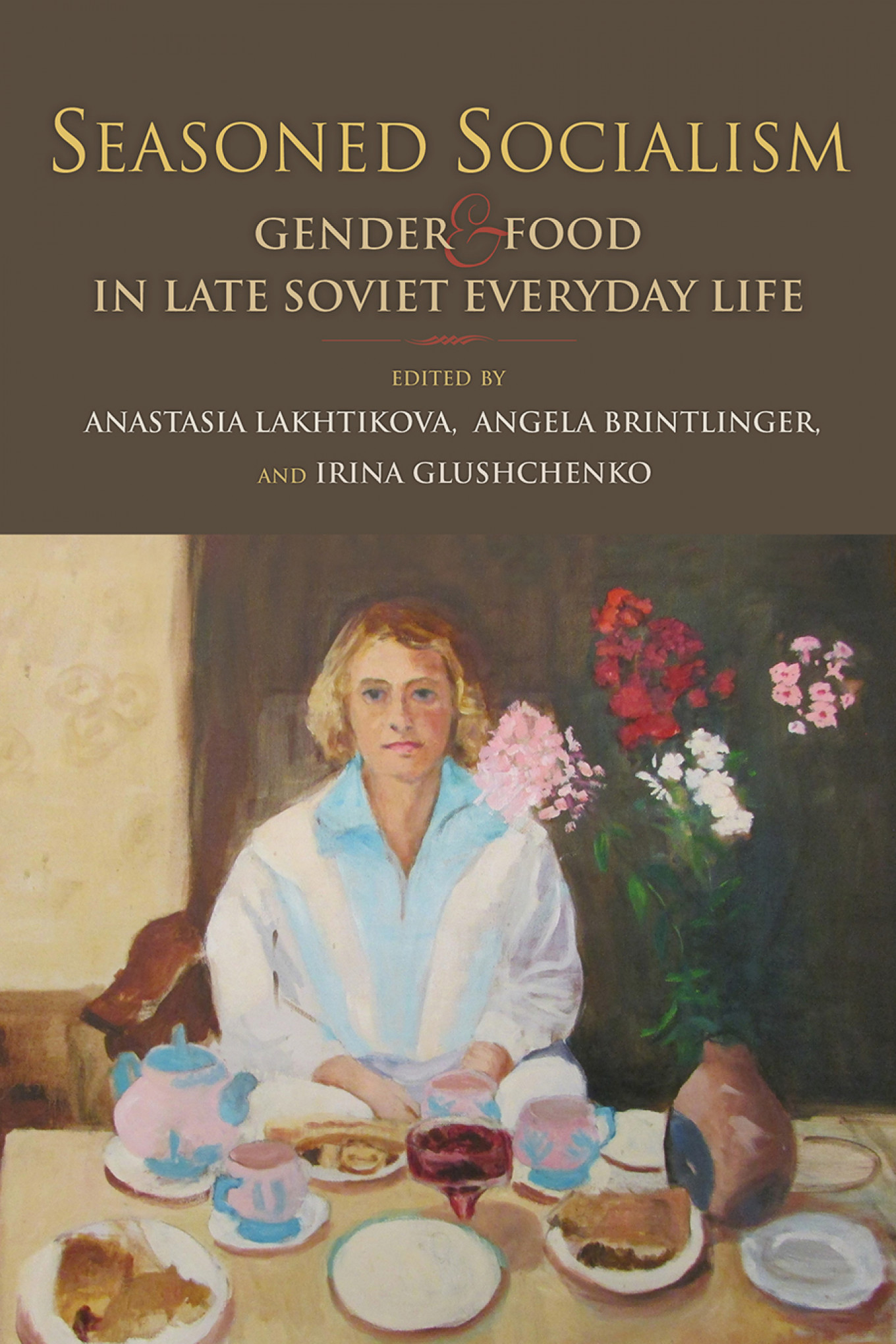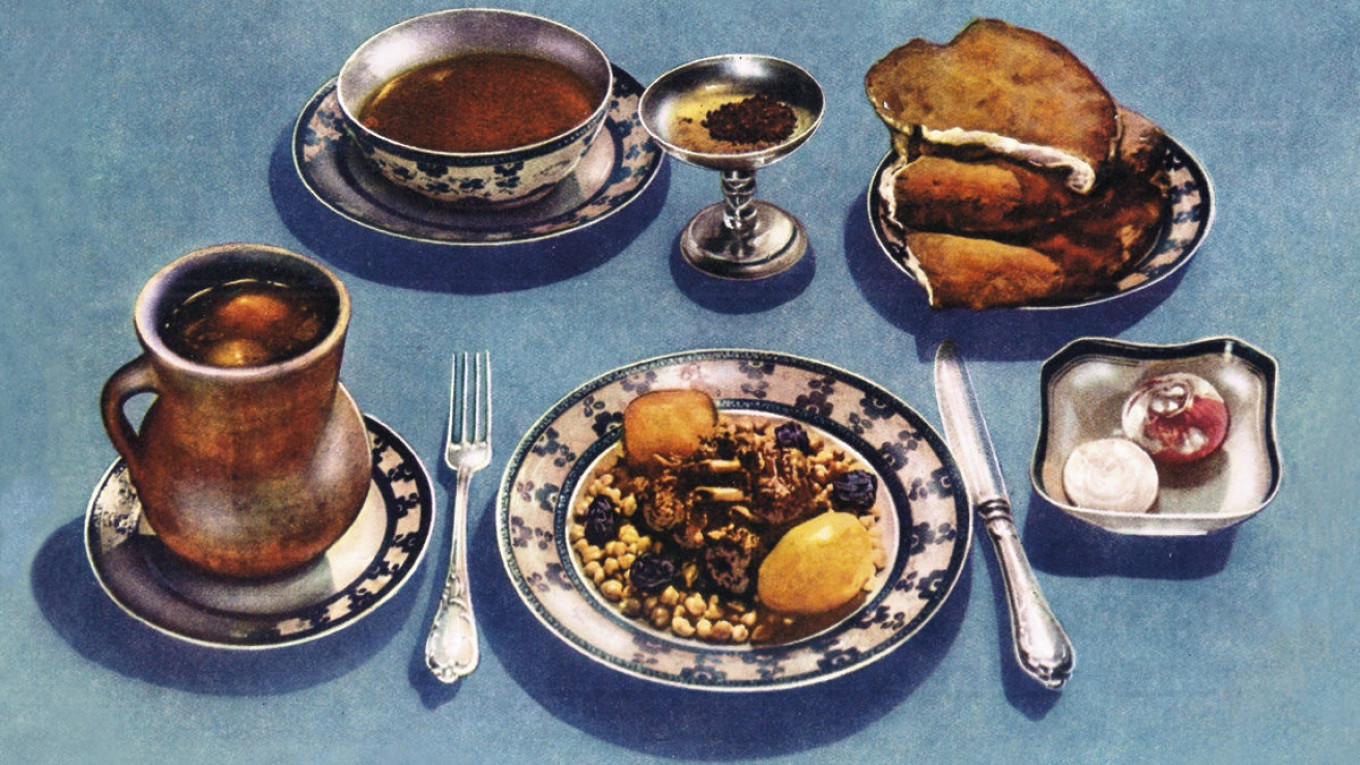No issue is as constant in Russian history as food. For the vast majority of the population, food —or its lack— has been a primary driver for many of the historical movements and milestones in Russia’s long history. This is particularly prevalent in the Soviet era.
Despite the introduction of technological innovations such as preservation and refrigeration, the Soviet century was one of privation due to wars, civil conflicts, revolutions, and a state-controlled economy that transformed food into a powerful tool for controlling the populace. Thus, food and the perennial Russian cycle of feast and famine is at the heart of any political, economic, sociological, or historical examination of the country.
Despite its importance, there is comparatively little scholarship in either the West or Russia on food and culinary history. This paucity makes the publication of “Seasoned Socialism: Gender & Food in Late Soviet Everyday Life” all the more exciting.
This collection of essays by noted scholars finally puts food front and center in essays that are as thought-provoking as they are entertaining and compelling. The net has been cast wide with authors exploring the vital role food plays in genres as disparate as literary studies, film studies, sociology, economics, and history. We see the idealized abundance portrayed in the golden age of Soviet cinema in stark contrast to the precarious nutrition of the gulags. We learn how culinary secrets were passed down through oral history and personal cookbooks, those waterlogged, butter-smeared volumes that have inspired many a modern cookbook.
One particularly fascinating aspect of “Seasoned Socialism” is its unvarnished examination of the scenario in which, as the authors describe in their introduction, “a society where food is managed by officialdom like a controlled substance and everyone is addicted to it.” The need for food is universal, and “Seasoned Socialism” is, at its heart, an examination of the uncomfortable moral dilemmas in which Soviet citizens often found themselves when making daily choices about sourcing food.
“Seasoned Socialism” manages to pull off the difficult trick of being at once a serious academic exploration of food’s role in history as well as a highly readable social history. Woven into factual analysis and intriguing statistics is an invitation to visit the battleground of a communal kitchen, to join the camaraderie of the workplace canteen, and to escape to the bucolic atmosphere of the dacha. This book, celebrating the indomitable spirit of Russian hospitality and its essential ingredients, is a must-read for all serious students of Late Soviet history, culinary historians, and anyone interested in a compelling examination of the relationship between food and history.

Excerpt from Chapter 10, "Schi Da Kasha, But Mostly Shchi: Cabbage as Gendered and Genre'd in the Late Soviet Period" by Angela Brintlinger
In the literary landscape of the 1970s and 1980s, with official socialist realist prose still dominating the shelves, all these authors—whether publishing in newspapers, literary journals, or émigré publications, having their submissions rejected by Soviet journals, or merely writing “for the drawer,” to use a Soviet-era expression—wrote about the sphere of everyday life, including cooking and culinary rituals, domestic economies, and family matters, and they did so in both fiction and nonfiction genres. As they searched for creative ways to carve out a political discourse of their own or, conversely, to cope with the personal consequences of certain state-sponsored political choices, they used the simple cabbage—a cheap and basic food if ever there was one—to deliver their messages.
As this essay demonstrates, their approach to “cabbages and kings”—that is, to the quotidian task of preserving, preparing, and consuming food, and metaphorically to politics and the political process—ultimately produced two very different sets of responses, both gendered and “genre’d.” In the case of male writers, literary output offered fact-based knowledge and personal opinions about culinary matters. In the case of female writers, the process yielded stories, addressed primarily to women and frequently in marginal genres, stories that were as much about cleaning up the messes created by the “politics” of Soviet everyday life as they were about the nurturing and generative nature of cabbage.
The genre distinctions in the works analyzed here suggest two different versions of cabbage discourse and perhaps even a competition, a desire on the part of men to invade the female-dominated domestic sphere or to usurp power and control over food discourse, wresting it away from women writers. Men use cabbage to claim the right to create and define national identity: Pokhlebkin, Genis, and Vail write in the genres of essay, culinary history, and dictionary and wield an authoritative nationalistic voice. Ironically, they do so not in mainstream historical texts or novels—the most authoritative genre in the Russian and Soviet context—but, in response to oppression and censorship, choose food writing instead.
Women, in contrast, focus more on sustenance and the practices of social and familial values. The fairy tale genre itself—the skazka—suggests ancient folk wisdom and women’s culture, though it was also used throughout the Soviet period both to promote and to disrupt official state propaganda. In their skazki Petrushevskaya and Ulitskaya present and evaluate feminine tasks of birthing, nourishment, and the administering of maternal love. Their works offer a deep and traditional well of women’s knowledge and of everyday coping skills, a body of knowledge that contrasts the men’s reference project and simultaneously remains ambiguous, always potentially harmless—simply storytelling among women and children.
While each kind of writing created its own cabbage discourse, it may be that they complemented rather than directly competed with each other. Together the male and female representations of cabbage, and of its place within food writing and fairy tales more generally, produced two ideas about Russian identity. The male view emphasized how cabbage was central to the diets of Russians and tied them to their past as peasants on the land, while also using it to underscore Russian adaptability and thus to highlight positive traits of the Russian character. In contrast, the female view centered on birthing and nurturing the Russian family. Along with its social and nutritional value, cabbage has had a stable folkloric value in Russia, and myths and beliefs about cabbage play a part in any meal—or text—in which it figures. As Terry Eagleton has written, “Food looks like an object but it is actually a relationship.” To continue this line of thinking, cabbage may look like a food, but it is actually a discourse that offers nourishment, national pride, folk wisdom, and family.
“Permitted” Dissent: William Pokhlebkin and the Culinary Dictionary
In late Soviet times, official propaganda—including educational propaganda—was challenged by various kinds of dissident thinkers. Denis Kozlov has argued that one effective way to subvert official clichés was to refute them with the help of empirical evidence, and he details the emergence of a group of scholars and writers who took pleasure in unearthing historical data that supported pre-Soviet Russian cultural traditions. Writing about food in this era was a similar type of subversion, a form of culinary, social, and political critique that preserved a pre-Soviet national identity in the face of the regime’s official ideology.
One such scholar was William Pokhlebkin (1923–2000), who wrote cookbooks and food essays in newspapers. A graduate of the Moscow State Institute of Foreign Relations (MGIMO) specializing in Scandinavia, Pokhlebkin is now best known for his work in the history of food, including dictionaries, histories of vodka and tea, and practical cookbooks. He might be considered a Russian version of the American food writer Michael Pollan, and his work ranged from the popular and practical to the ideological, defining and asserting cultural traditions. For Pokhlebkin, the reach back to traditional foods and methods of preparation was as much a gesture of anti-Soviet (or antiofficial) sentiment as it was an exploration of deep-rooted Russian culture.
While in the Soviet Union the science of nutrition was state-sponsored, Pokhlebkin strove in his writings to combat that authoritarian reinvention of Russian culinary habits while remaining within “permitted” parameters. He saw the future of Russian eating in its past, and cabbage was central to that vision. Pokhlebkin can be seen to represent that “permitted dissent” about which Kozlov and Dina Spechler have written: he was one of several Soviet-era figures who contributed to an alternative cultural and historical narrative that supplemented or even came to supplant the Marxist-Leninist version of Russian history.
Perhaps Pokhlebkin was destined to write about food given that his surname is based on a synonym for soup, pokhlëbka. Beginning in 1972, Pokhlebkin published regular essays on food and food history in the newspaper Nedelia (The Week). These pieces were early variants of the texts that were to become his Culinary Dictionary, a work he began to collate in 1985, in the earliest days of perestroika. Much to his dismay, this first published edition of the Culinary Dictionary was marred by censorship related to Mikhail Gorbachev’s anti-alcohol campaign of the mid-1980s. For example, entries on the topic of alcohol and references to wines and liqueurs were struck, “correcting” the text to conform to state policies designed to fight drunkenness and alcoholism. In the prefatory material to subsequent editions Pokhlebkin’s impatience with state policy comes through very clearly. He complains bitterly that Gorbachev’s regime and its perestroika will be seen by future generations as truly “troubled times” in Russian history, evoking old Russia as he builds the bridge between ancient traditions and current culinary knowledge and practices.
In his reactions to state power and authority of any kind, Pokhlebkin shows all the symptoms of an autodidact: inflexible, thin-skinned, grouchy. Though quick to complain about editorial interventions into his text, Pokhlebkin chooses the driest discourse possible for reference material, his own prose stiff with careful caveats and explanations. By the third edition (and the first post-Soviet one), he had begun to conceive of his work still more broadly and was openly competing on an international playing field; he brags, for example, that “this [third] edition is on the whole considerably more complete than most single-volume foreign culinary dictionaries.” Better than his foreign competitors, Pokhlebkin also notes that he built on his own success and was the first author ever to include Russian regional culinary terms in a reference text.
Entries in the Dictionary vary from the general to the extremely detailed, defining everything from traditional Russian foods and drinks and those from other former Soviet republics to foreign phrases and food items. Pokhlebkin’s reference volume is replete with explanations, examples, and details. At the same time it also features a certain degree of “myth-busting,” as Pokhlebkin strives to clarify and explain Russian culinary terminology. Here, as in his other books, the culinary historian gives more than just facts; he imparts his personal opinions about food history, while consistently assuming the voice of authority.
Cabbage, Pokhlebkin reminds his reader in the entries kapusta, kapustniki, is an “ancient cultivated garden vegetable,” and in the book he offers various recipes for pickling cabbage and for making cabbage rolls (golubtsy), as well as for stewing it as a filling for pies and pasties. But one of the longest entries in the Dictionary is devoted to shchi, cabbage soup. Here Pokhlebkin’s nationalism is evident as he asserts the unique “Russianness” of cabbage soup, the “primary classic Russian national hot soup dish,” and dates the soup to ninth-century Rus’. In a surprisingly folksy moment given the genre of the Dictionary, Pokhlebkin shares an aphorism: “You can get tired of your own father, but of shchi—never!”
According to the historian, shchi was invented over the course of time by peasants who were desperately trying to follow the dietary restrictions of Orthodox Christianity. It was, moreover, the direct result of “a very important quality of the ancient Russian people—their open-mindedness and tolerance.” Pokhlebkin maintains that three of the six main ingredients in shchi are “foreign”; cabbage, sour cream, and the spices (onion, garlic, pepper, bay leaf) were not originally native to Russian agricultural and culinary traditions. Three more ingredients are “local” (meat, mushrooms, flour). This combination, in his eyes, suggests two Russian national traits: the abilities to take advantage of their own land and to adapt themselves (and their recipes) to imports. Indeed, Pokhlebkin invests all kinds of cultural meaning in the invention of shchi: “In a word, shchi incorporated all the best sides of the Russian character—openness, the ability to perceive the very best, open-mindedness, the ability to combine the native and the national with the new, the unknown, and the borrowed. And one more characteristic of Russian identity can be seen in shchi—the ability not to get stuck in one place, not to blindly hold to things once accepted, but to improve, correct, add, if experience suggests such a path and there is an opportunity.” Taking a dish that is associated with the most basic of ingredients, the historian embroiders a rich and inventive narrative to laud the Russian character. He even celebrates the fact that shchi has its “own name” in Russian, finding in the peculiar appellation shchi evidence to support his idea that cabbage soup is more central to everyday life in Russia than the nameless “soup with cabbage” one finds in Western Europe. To explain the key role played by shchi in the Russian diet, Pokhlebkin argues that this national dish has one vital characteristic: “an absolute lack of monotony [nepriedaemost’]. One can eat shchi every day and never get tired of it,” he claims. Perhaps.
This culinary dictionary includes all kinds of information: types of foods, recipes, and variants, and it also details folk sayings, superstitions, and personal preferences (like the importance of black [rye] bread to accompany a plate of shchi). Nonetheless, the end result resembles in places a political tract or a nationalistic ideological treatise. By delineating the terms and references related to food and cuisine and tracing them through Russian history, Pokhlebkin was able to find continuity with the past and simultaneously protect the information he saw as in danger of being lost during the period of Soviet values and centralized economy. The level of dissent permitted to Pokhlebkin gradually increased, as is evident both in his weekly newspaper columns and in the evolution of his Dictionary over eight years, from the censored-for-alcoholic-content first edition through the triumphant third edition in 1996. Despite, or perhaps because of, his sometimes extravagant or unusual claims, Pokhlebkin entered the post-Soviet period as a well-respected voice in Russian culinary history.
For ease of reading, footnotes have been removed from the text.
Excerpted from “Seasoned Socialism: Gender and Food in Late Soviet Everyday Life” edited by Anastasia Lakhtikova, Angela Brintlinger, and Irina Glushchenko, published by Indiana University Press.
Copyright © 2019 by Indiana University Press.
Used by permission. All rights reserved.
For more information about the authors and their books, see the publisher’s site.
A Message from The Moscow Times:
Dear readers,
We are facing unprecedented challenges. Russia's Prosecutor General's Office has designated The Moscow Times as an "undesirable" organization, criminalizing our work and putting our staff at risk of prosecution. This follows our earlier unjust labeling as a "foreign agent."
These actions are direct attempts to silence independent journalism in Russia. The authorities claim our work "discredits the decisions of the Russian leadership." We see things differently: we strive to provide accurate, unbiased reporting on Russia.
We, the journalists of The Moscow Times, refuse to be silenced. But to continue our work, we need your help.
Your support, no matter how small, makes a world of difference. If you can, please support us monthly starting from just $2. It's quick to set up, and every contribution makes a significant impact.
By supporting The Moscow Times, you're defending open, independent journalism in the face of repression. Thank you for standing with us.
Remind me later.







